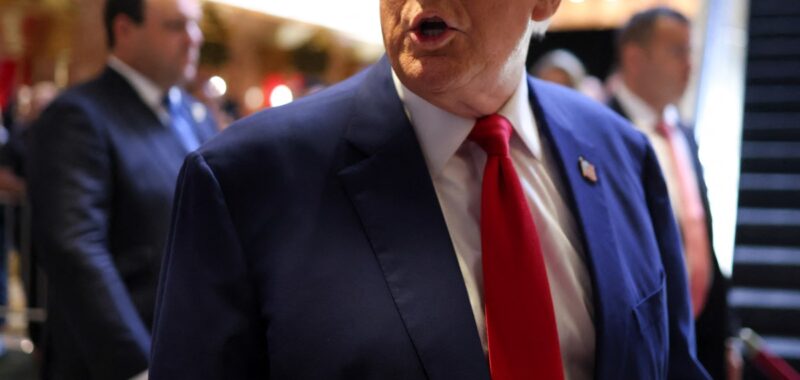Trump used a press conference to remind voters that he’s been accused of sexual assault.

A press conference is a tool for a presidential candidate to get reporters and voters talking about a topic of his or her choice. So why did Donald Trump spend 45 minutes reminding them about some of the many sexual-assault allegations against him?
Late this morning at Trump Tower, the former president took the microphone and spoke at length about the civil case in which he was found liable for sexually abusing the writer E. Jean Carroll. He mentioned the other allegations against him that came up in the trial. For good measure, he also dredged up the multimillion-dollar fraud judgment against him and the trial in which he was found guilty of 34 felonies. And, flanked by some of his lawyers, he griped about his representation. “I’m disappointed in my legal talent,” the former president said. (He’s no peach of a client himself.)
Among other lowlights, Trump accused Carroll of basing her allegation on an episode of Law & Order. He insisted that the Biden Department of Justice was somehow behind a civil proceeding brought against him by a private citizen that began while he was still president. And he repeated baseless claims that the DOJ was coordinating with Manhattan District Attorney Alvin Bragg on his felony case. Despite having spent the past few weeks lambasting Vice President Kamala Harris for not taking reporters’ questions, Trump left without taking questions.
Much of this is bizarre, but little of it is fresh, which makes Trump’s goal even harder to understand. The ostensible news was an appeal in the Carroll case heard today, but the result seems to be to thrust back into the public eye a series of decisions and allegations that had been mostly left behind, but which could remind voters of what they like least about Trump. The appearance seemed to entice new defamation cases more than swing voters.
Another former Republican president, Ronald Reagan, once wrote, “When you’re explaining, you’re losing.” You’d expect that to be especially true when you’re explaining years of sexual-assault allegations against yourself. Meanwhile, Harris is barnstorming swing states, giving interviews to Spanish-language radio, and prepping furiously for next Tuesday’s debate. (Trump has said he doesn’t need to practice: “I’ve been preparing all my life for this debate.”)
But here’s the thing: Trump isn’t obviously losing. Most polling averages show Harris with a small lead, but once you account for margins of error and the Republican advantage in the Electoral College, it’s a toss-up. Nate Silver’s election forecast favors Trump at the moment, as Trump was happy to mention today. Reporters and operatives obsess over campaign tactics and talking points, but nothing seems to demonstrate how calcified American politics are like this split screen of the candidates: one hustling on the hustings, one rambling through his own peccadilloes, and the race neck and neck.
To be sure, Trump’s remarks today do connect to some of his campaign themes. He insists that he is a victim of a weaponized Justice Department (that’s straightforward projection), and he has decided to paint himself as the only thing protecting his supporters from nefarious forces such as President Joe Biden. The attorney and spokesperson Alina Habba, more on message than Trump, made that connection explicit today. “You must vote Donald Trump back in, because as an attorney, as a woman, as a mother, our future of this country depends on it,” she said. “The DOJ is supposed to help our country and protect us, not attack us because you cannot win in the polls.” (The message is less persuasive coming a day after Biden’s own son pleaded guilty to three felonies in a case brought by the DOJ.)
The martyrdom act remains something that appeals to Trump’s existing supporters but seems less likely to expand his coalition. In an election as close as this one, small differences in swing-state turnout or likability could be a deciding factor. Come November, will Trump look back on this press conference as a wise investment of time and attention?

